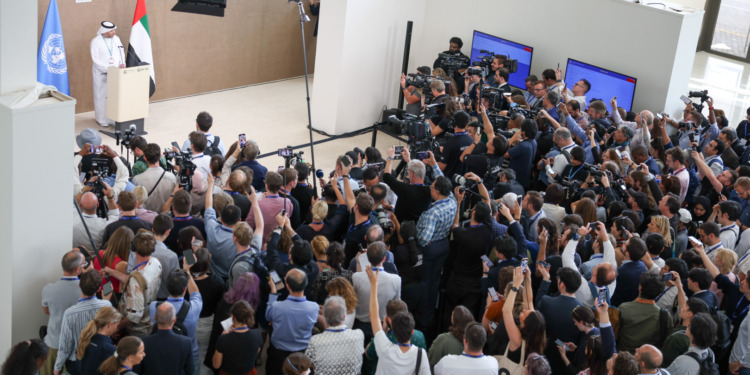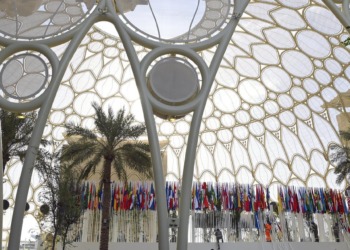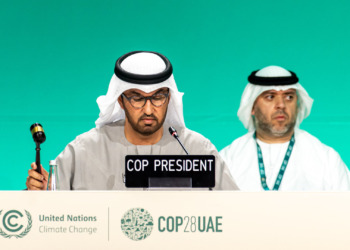![]() This article by The Energy Mix is published here as part of the global journalism collaboration Covering Climate Now.
This article by The Energy Mix is published here as part of the global journalism collaboration Covering Climate Now.
UN climate negotiations seemed certain to go into overtime this morning after the COP28 secretariat published a draft decision text that left out any clear timeline for phasing out fossil fuels and was dismissed as “unacceptable”, “incoherent”, “grossly insufficient”, and a “slap in the face” by angry, frustrated, and increasingly sleep-deprived delegates.
The sense of fury and determination at the sprawling conference site in Dubai was driven primarily by draft decision text on the Global Stocktake, the culmination of an essential, two-year process meant to track countries’ progress on their climate commitments under the 2015 Paris Agreement and set them up for faster action in the years ahead. That text is seen as “the main outcome of the summit,” but “people hate it,” Climate Home News writes this morning.
“Small island states slammed it as ‘a death warrant’, their spokesperson getting teary,” Climate Home recounts. “For the EU it contains elements that are ‘simply unacceptable’. Campaigners variably described it as ‘a scandal’, ‘divorced from reality’, and ‘a dog’s dinner’.”
‘OPEC Dictated the Text’
“We will not sign our death certificate,” declared Samoan Natural Resources and Environment Minister Cedric Shuster, chair of the Alliance of Small Island States (AOSIS). “We cannot sign on to text that does not have strong commitments on phasing out fossil fuels.”
“We will not sign their death certificates,” an Australian delegate echoed back, after Marshall Islands negotiator John Silk said the draft declaration would commit his country to a “watery grave.”
“This obsequious draft reads as if OPEC dictated it word for word,” wrote former U.S. vice-president and Climate Reality project founder Al Gore, adding that the COP Presidency’s language had left negotiations “on the verge of complete failure”.
One overnight news report said the European Union, the United States, the United Kingdom, Canada, Japan, and Australia were all threatening to block agreement on the draft text. The UK’s Energy & Climate Intelligence Unit (ECIU) has a longer list of critical voices, including the EU, Germany, the Marshall Islands, AOSIS, Elders Group Chair Mary Robinson, COP26 President Alok Sharma, Spain, the UK, the Least Developed Countries negotiating group, the United States, Ugandan climate campaigner Vanessa Nakate, and the Umbrella Group, a negotiating bloc that includes major fossil fuel producers like Australia, Canada, Japan, and Norway.
“These are just a few of those who have rejected the weird and messy Global Stocktake text which finally issued early evening from the UAE Presidency, having been promised first thing in the morning,” the ECIU writes.
No Timeline for Fossil Phaseout
An earlier working draft of the text had included a fossil fuel phaseout as one among several options for negotiators to choose from.
The latest version includes language that calls for “reducing both consumption and production of fossil fuels, in a just, orderly and equitable manner, so as to achieve net zero by, before or around 2050, in keeping with the science,” the Guardian writes.
But it leaves out the reference to a phaseout or phasedown that more than 100 countries had supported in the course of the COP, and that scientists, international agencies, businesses, and civil society have been insisting on for months.
And instead of making reductions mandatory—setting percentages and target dates to get the job done in line with climate science — the text “frames such reductions as optional, by calling on countries to ‘take actions that could include’ reducing fossil fuels,” among a menu of other energy options, the Guardian explains.
Related Articles: Cities at COP28: The Global Stocktake Outcome Text Needs to Advance Multilevel Action | COP28: Climate Finance in the Spotlight | World Bank to Spend 45% of Its Financing on Climate-Related Projects | COP28: Danish Investment Firm Launches $3 Billion Clean Energy Fund
“That one word ‘could’ just kills everything,” and it means that “we can’t accept this text,” said Irish Environment Minister Eamon Ryan. “It’s not anywhere near ambitious enough. It’s not broad enough. It’s not what parties have been calling for… we have to stitch climate justice into every part of this text and we are not anywhere near that yet.”
“I don’t know what will happen to my kids tomorrow if we stick to this text,” said French Energy Transition Minister Agnès Pannier-Runacher.
Beyond the fatal use of the word “could”, national representatives and veteran observers pointed out several fundamental flaws in the energy text:
• A laundry list of more than a half-dozen “could” options, from practical, affordable pathways like solar, wind, and energy efficiency to speculative but fossil-friendly technologies like carbon capture and storage (CCS) and fossil-derived “blue” hydrogen, enough to replace a coordinated, global push to rein in climate pollution with a mishmash of ultimately ineffective national actions;
• Weakened language on a coal phaseout compared to agreements at the last two COP summits in 2021 and 2022;
• A lack of any clear, short-term targets, with “non-prescriptive language” that fails to specify percentages and target years for emission and fossil fuel reductions;
• A lack of any clear timelines for mid-century decarbonization;
• Language on eliminating fossil fuel subsidies that “was probably weak enough that it would catch absolutely no subsidy anywhere”, according to the ECIU;
• Little or no commitment to the financial support from the world’s richest nations that will be essential to the energy transition in developing countries;
• No clear or immediate path to fund climate change adaptation in the countries already facing the brunt of the climate emergency;
• Action words throughout the text that might look fine to a casual reader, but would signal weaker commitments and less ambitious results according to the UN climate secretariat’s style guide.
Words Matter
“It is not good enough to say you recognize and respect the science but then fail to take heed of its dire warnings in the collective action you commit to,” said Robinson, herself a former president of Ireland, who had previously had COP28 President Sultan Al Jaber try to explain to her that there is “no science” linking a fossil phaseout to a 1.5°C climate target.
“It is not good enough to use weak language or to permit loopholes for the fossil fuel industry to continue to contribute to the very problem countries are meant to be committed to tackling here in Dubai,” she added. So “this current version of the COP28 text is grossly insufficient.”
“This text is a nightmare of weak proposals and internal contradictions,” agreed Tom Evans of the E3G climate think tank. “The next 17 hours must see the champions of ambition rally hard.”
“If this race-to-the-bottom monstrosity gets enshrined as the final word, this crucial COP will be a failure,” said Climate Action Network-International Chair Jean Su, acting co-executive director of the U.S. Center for Biological Diversity.
While Power Shift Africa founder Mohamed Adow noted that even a terminally weak text would be the first ever to include the words “fossil fuels”, his colleague Amy Giliam Thorp declared the section on climate change adaptation “utterly disappointing” and “an injustice to communities on the frontline of the crisis,” CBC writes.
“The text is even weaker, more vague in many areas, and lacking in ambition,” she said. “A framework focused on action without concrete targets, especially to support developing countries, is pointless and toothless.”
Time is Running Out
And yet, “there were rumours yesterday evening that Al Jaber may stick to his guns on keeping timing tight, and force a take it or leave it option which would be deeply divisive,” the ECIU writes Tuesday morning. The COP28 President had repeatedly insisted he would close the conference by today at 11 AM local time, with several news reports suggesting his timeline was being driven, at least in part, by the need to get the Expo City Dubai facility set up for the city’s annual Winter Show, which opens December 15.
But “negotiators were clear last night that there was no way discussions could begin on the basis of the text issued yesterday,” ECUI says. “So, after a heads of delegation meeting in the early hours of the morning, we now wait again for a new text to appear,” with “huge pressure” on Al Jaber—to pull the conference back from the brink of failure, salvage his own and his country’s reputation, and prove wrong the critics who’ve insisted it was a dire mistake to put a fossil fuel CEO in charge of global climate talks.
While delegates and observers waited for at least one new round of text—and with EU climate commissioner Wopke Hoekstra saying he’d booked his flight out of Dubai for Friday—observers looked to rich nations for commitments on climate finance and technology transfer to developing countries that would help boost support for a fossil fuel phaseout.
“We’ve been hearing from the African Group in particular, but they’re not the only ones, that they’re not necessarily opposed to transitioning from fossil fuels to renewable energy, but they’re going to need support,” Romain Ioualalen, global policy campaign manager at Oil Change International, told a news conference Tuesday morning. If developed countries had kept their promises on climate finance and committed to support the transition, he said, “maybe the deal would be more secure at this stage.”
For the final text to work, the energy section must also clearly place the onus on developed countries to lead the transition, Ioualalen added.
“We’ve heard a lot about Saudi Arabia blocking, and that’s true, let’s be honest,” he said. But negotiators also know that the majority of the world’s fossil fuel expansion is taking place in rich countries.
“If we weren’t in that situation, a lot of countries would be much more comfortable with the deal right now. So we talk about Saudi Arabia, but let’s talk about the U.S., Canada, Australia, Norway, and the UK. Let’s be fair in this conversation.”
Editor’s Note: The opinions expressed here by the authors are their own, not those of Impakter.com — In the Featured Photo: H.E. Ambassador Majid Al Suwaidi, Director-General and Special Representative of COP28, speaks to media at the UN Climate Change Conference COP28 at Expo City Dubai on December 12, 2023, in Dubai, United Arab Emirates. Featured Photo Credit: COP28/Neville Hopwood.










